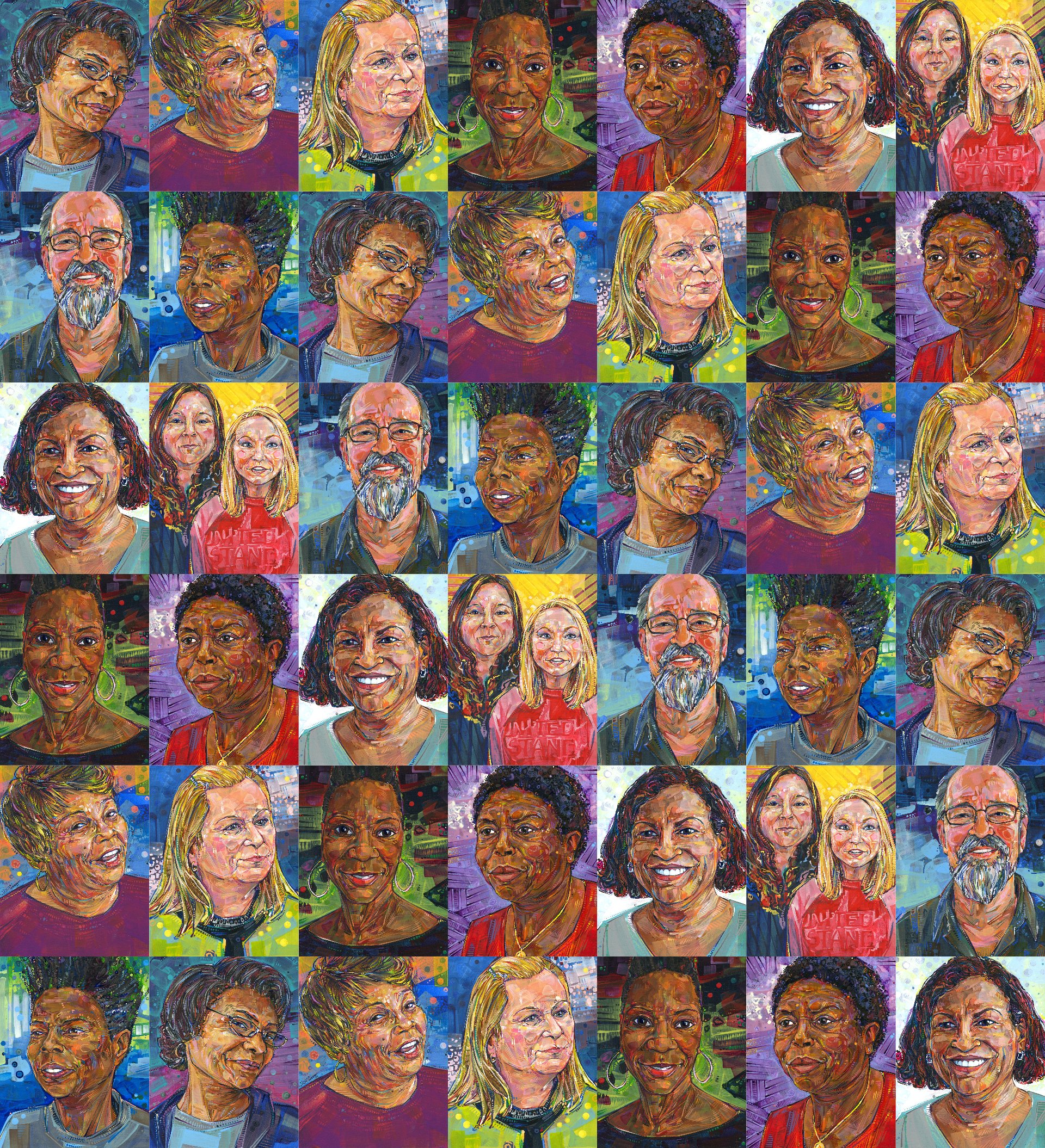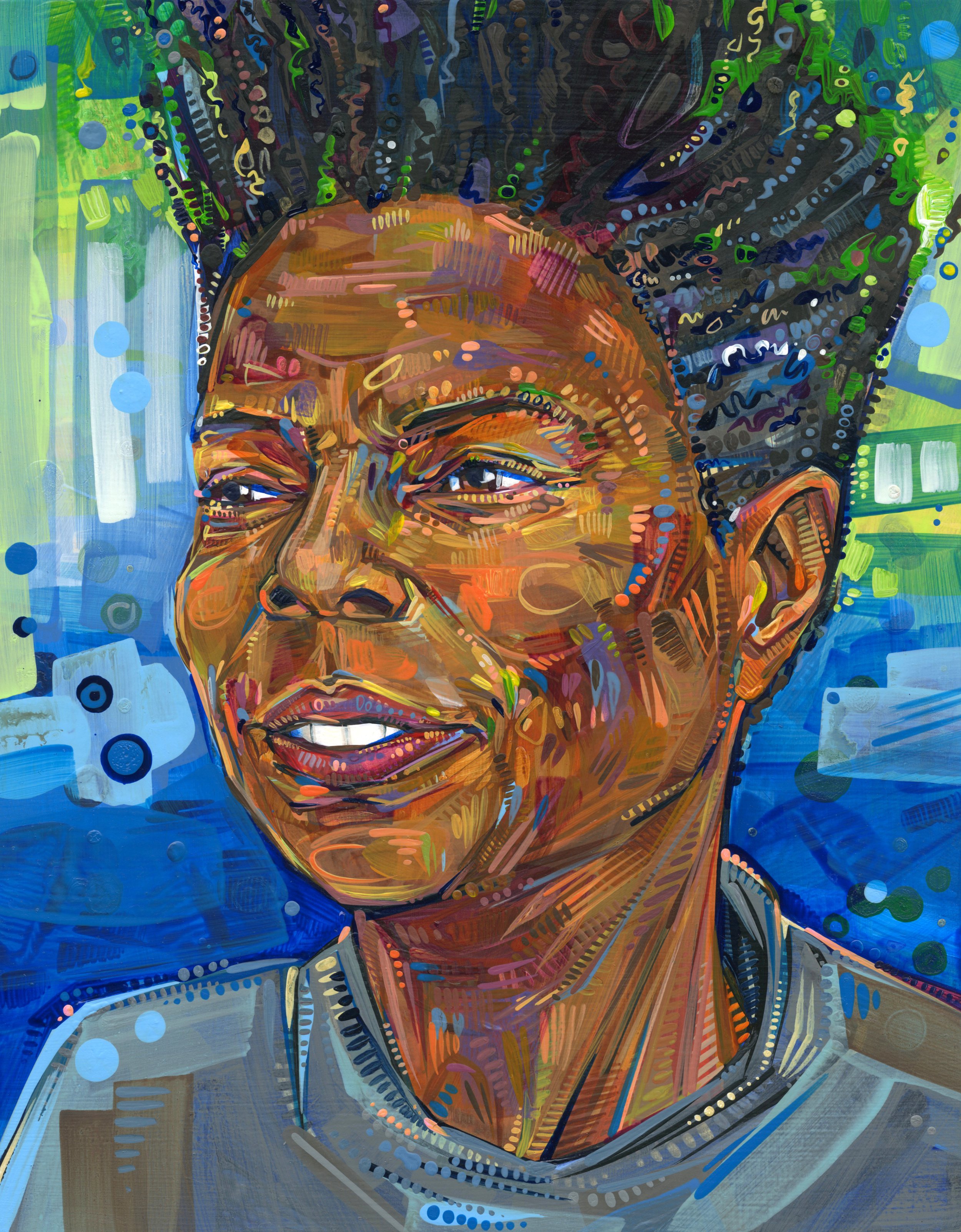
The Future We Need
Organizing for a Better Democracy in the Twenty-First Century

Bettie Douglas
Some of those who oppose workers’ rights say that fast-food companies shouldn’t have to respect their rights because most people working at places like McDonald’s are middle-class teens working for spare change.
This story of a Black grandmother working at a McDonald’s in St. Louis, Missouri, gives the lie to this excuse and illustrates why targeting the ultimate profiteer rather than local franchise owners is an important strategy.
Lidia Victoria
Lidia Victoria immigrated from the Dominican Republic, ultimately settling in North Carolina to work in meatpacking. She would help win the fight for a labor union’s legal recognition at the world’s largest hog-killing factory.
This victory required a strategy that centered on the fight against white supremacy, including its impact not only on immigrant workers and workers of color but also on the white workers in the plant. Lidia’s story highlights the importance of building a strong multiracial movement of workers.
Sanchioni Butler
Unlike the workers at Smithfield Packing in Tar Heel, the workers at the Nissan auto plant in Canton, Mississippi, have not successfully gotten the company to recognize their union. UAW organizer Sanchioni Butler, a southern autoworker and one of the pioneering women in the industry, puts this and other struggles in the context of the battle against white supremacy and patriarchy.
In her story, she shares, “We have a lot of work to do as unions. We have a beautiful template. We just need to bring that template into the twenty-first century.”
About the Book
The Future We Need positions the struggle to build collective bargaining power as a central element in the effort to build a healthy democracy. It offers new approaches to how we build worker power in a world in which the economy has dramatically changed over the last century—evolving collective bargaining as we know it to match the needs of modern people, not only to change their wages and working conditions, but to be able to govern over more aspects of their lives. It explores existing levers of power and new ones we must build for workers to have the ability to collectively negotiate their conditions in today and tomorrow’s context. Stories of working people weave throughout the book, humanizing the theoretical frameworks. Perhaps most importantly, these stories illustrate the necessity of centralizing the fight against white supremacy and gender discrimination, which is evidenced in nearly all case studies and stories throughout the book.
A foreword from DeMaurice F. Smith, Executive Director of the NFL Players Association:
The Future We Need is also a timely lesson given the numbers of people taking to the streets in support of individual, civil, and human rights. There is a strong link between issues like voting rights and access to health care and the protests that arose after the death of George Floyd and the outburst of xenophobia, racism, and violence on display at the Capitol on January 6, 2021. This book is an important and necessary guide for those who believe in the sanctity and dignity history bestows on those who get up every day to do honest work for their families and themselves—and those who understand why it is equally important and necessary to resist and confront those who believe otherwise. It’s a book for everyone who is still committed to the American Dream.
“A refreshing call-to-action, The Future We Need helps us understand both the challenges facing workers today and what must happen to change our economy for the better, with clarity and insight.”
-Ai-jen Poo, Founder and Executive Director, National Domestic Workers Alliance and author, The Age of Dignity
“A must-read for anyone who wants to know how to build the power to achieve a fair economy and a dignified future for all.”
-Nancy MacLean, author of Democracy in Chains: The Deep History of the Radical Right’s Stealth Plan

Rubynell Walker-Barbee
Rubynell Walker-Barbee is one of the many Black women who was personally impacted when unemployment benefits were suddenly denied to school workers in Georgia. Hailing from union-dense Detroit, she was shocked to find how little her Atlanta food-service coworkers understood about unions. Her story illustrates the difficulty of organizing and ultimately establishing a union workplace.
Jeff Crosby
In this story, General Electric forgets the value of negotiating with its own employees in ways that could benefit the company and its workforce. Jeff Crosby, a veteran labor activist and organizer, recounts how GE opened its Factory of the Future, rejecting union proposals aimed at enhancing worker skills. Its failure illustrates how self-destructive it is for corporations to ignore human rights and workers’ interests in pursuit of short-term gains.
Kimberly Mitchell
Kimberly Mitchell is a union organizer and labor rights activist, single parent, consumer, homeowner, and small-business owner who is acutely aware of the intimate connections between her identity as a worker and the struggles she faces in every other aspect of her economic life.
Her story is one of millions that illustrate why progressive organizing today must address the whole person, not just the slice we bring to the workplace.
About the Authors
Smiley and Sarita officially started to plan out the book in 2017. However, the content itself has a much longer origin story. Jobs With Justice was founded in 1987 with the goal of expanding organizing and collective bargaining power. The only thing that hasn’t changed since then is the commitment to centering the struggles of everyday people, including efforts to combat white supremacy and gender discrimination which big companies often leverage to divide us from each other. Sarita and Smiley decided to put this on paper not only to clarify the work of Jobs With Justice but to provide a framework for those they may not be in a relationship with who seek to have more control/decision-making power over their economic conditions.
Sarita and Smiley were lucky enough to work with an amazing editor, Karl Weber, who has worked with such authors as former president Jimmy Carter and edited such works as Waiting for Superman and Food, Inc.—both of which accompany documentaries by the same names. Karl brought a level of cohesion to the book that would not have otherwise been there.
Erica Smiley
Smiley is the executive director of Jobs With Justice. A long-time organizer and movement leader, she has been spearheading strategic organizing and policy interventions for Jobs With Justice for nearly 15 years. Prior to taking up her current position with the organization, Smiley served as organizing director for Jobs With Justice developing campaigns that resulted in transformative changes to how working people organize and are civically engaged at their workplaces and in their communities. During her tenure at Jobs With Justice, Smiley has served in numerous leadership capacities including as campaigns director and as senior field organizer for the southern region.
Smiley is originally from Greensboro, N.C. where she is a proud product of public schools. She currently resides in New Jersey alongside her partner and daughter.
Sarita Gupta
Sarita is vice president of U.S. Programs at the Ford Foundation, overseeing the foundation’s domestic work including Civic Engagement and Government, Creativity and Free Expression, Future of Work(ers), Technology and Society, Disability Rights, and Gender, Racial, and Ethnic Justice. She previously served as executive director of Jobs With Justice, a leader in the fight for workers’ rights that shapes the public discourse on every front to build power for working people and create an economy that benefits everyone. There, she led a network of 30+ labor and community coalitions that changed the conversation and moved multiple voices, from labor to faith, into action.
She has been on the frontlines of organizing and policy campaigns to boost wages, worker voice, and working conditions for all working people and improve labor and civil rights protections for immigrant men and women. Sarita also played a key role in building numerous campaigns like the Asia Floor Wage Alliance – a global coalition of trade unions, workers’ rights, and human rights organizations pushing for higher wages in the global garment industry – and the United Workers Congress, focused on raising labor standards and protections for low-wage workers across industries. She also co-founded and led Caring Across Generations which is a campaign effort calling for a much-needed care infrastructure to provide high-quality, affordable options for individuals and families, support for family caregivers, and the care workforce.
Born in the United Kingdom and raised in Rochester, N.Y., Sarita currently lives in Maryland with her husband and daughter.

Allyson Perry and Heather DeLuca-Nestor
Allyson Perry and Heather DeLuca-Nestor are two of the teachers who participated in the West Virginia work stoppage of 2018. Their struggle inspired a wave of struggles across the country. At the time, both were presidents of their county union locals—Allyson in Marion and Heather in Monongalia. They led an effort in a state that makes us rethink how we support and invest in local and regional efforts in the heartland and the South. They were successful and both have stories to tell.
Cynthia Murray
Associates working at Walmart stores are extending their fight for fair treatment beyond their local management to the profiteers who drive the corporation’s policies. Cynthia Murray, a woman organizing with what was known at the time as the Organization United for Respect, put it best when she said, “With a company like Walmart, you can’t just go store to store. We had to get to the top of the company.” Cynthia’s story illuminates the value of listening to, learning from, and elevating the voices of a multiracial movement to ensure those voices are driving change.
Deloris Wright
Deloris Wright has helped to provide a voice and a measure of power to some of the most unheard, powerless individuals in U.S. society—domestic workers. Her leadership and experience of fighting for a voice as a domestic worker has helped her recognize how important it is to extend her voice and power in all aspects of her life, including as a renter. She is now a key leader in building a tenant union. Through her organizing work, she is making life better not just for herself, her family, and her colleagues but also for people throughout society who need a place to stand from which they too can assert their right to be heard.
About the Artist
Gwenn Seemel’s polka-dot cubist painting style has been delighting art lovers and inspiring artists for almost two decades now. In 2017, a tech company recognized her contribution to the look of the new millennium by naming one of their photo filters “the Seemel.”
“My part of the book pleases me immensely. I love that I get to travel to new places in the U.S. and meet new people. And I am thrilled by the way the gesture breaks with the portrait tradition that most people know about—the tradition that dictates that portraiture is only for popes and kings. My genre has a history of uplifting the nobility of those not belonging to the noble class, but it’s not as well known. I love that these paintings will reinforce the newer, more interesting portraiture tradition.” —March 6th, 2019
Gwenn Seemel’s work in progress with an excerpt from Sanchioni Butler’s interview with Erica Smiley.













